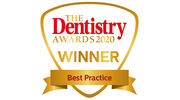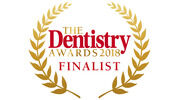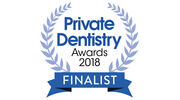Dental care is an essential part of looking after yourself. At Aquae Sulis we always have our patients’ best interests at heart and we’re passionate about helping people who have been left fearful of the dentist to overcome their anxiety and begin to feel that dental care can be a positive experience.
That won’t happen immediately, but it has to start somewhere. The problem with fear is that it puts people off seeing their dentist regularly to the point where problems build up. That can lead to pain and permanent damage to teeth that can only be fixed with expensive dental work — and no one wants that.
We’d prefer our patients to never need serious dental work and simply let us check their teeth regularly so we can spot any problem areas in good time. Combined with regular dental hygiene appointments, there’s no reason why this preventative approach can’t help everyone keep their natural teeth for life.
Prevention really is much better than cure when it comes to teeth because adults only get one set. Once the damage starts, even with the best dentistry in the world, it can never be fully undone. That’s why it’s our mission to help our patients protect their teeth with the best preventative services and ethical advice — we’ll never recommend treatment that’s not in the interests of your long-term dental health.
Gum disease is one of the main causes of tooth loss yet people are often unaware they have it because it is not painful and doesn’t affect their daily life. If left untreated the impact can be serious, damaging the bone and tissue that support the teeth.
The good news about gum disease is that it is preventable and, particularly in the early stages, is relatively easy to treat. Where it is identified in patients at Aquae Sulis we provide focused treatment, perhaps a course of multiple hygiene appointments over a short period, to clear it up, and for all patients we advise ongoing check-ups to make sure problems like this are spotted early in future.
Prevention
Preventive dentistry means caring for teeth to keep them healthy and avoid cavities, gum disease, enamel wear and other damage. It’s a task shared by patient and dentist in cooperation, working in different ways, such as daily brushing and flossing and regular check-ups, towards the same goal.
Regular visits to the dentist are about more than just enjoying the fresh, clean feeling hygiene sessions leave in the mouth. Of course, professionally removing calculus and bacteria is an important part of maintaining oral health (however thoroughly people brush and floss every day, everyone misses some areas, especially at the back of the mouth). During check-ups we’ll also be screening for problems that may be developing unnoticed by the patient, such as cavities or oral cancer. Read more >
Oral Hygiene
It’s shocking to think that many people have never been given the right advice on how to clean their teeth and gums properly — the most critical aspect of dental health.
We take this responsibility to our patients seriously because we want to empower people to protect their oral health as well as they can for life. When we see patients for a check-up we’re hoping there are no problems such as cavities, gum disease and enamel wear and we ideally want to pass them on to the hygienist for a routine clean before they go. Read more >
White Fillings
We use tooth coloured fillings because they look better and are safer than traditional amalgam silver filings (there is some debate around the toxicity inherent in the latter).
White fillings can be blended to match any shade of tooth so they look natural and the composite resin we use to make them can also be used to build up cracked or chipped teeth, improving their strength and cosmetic appearance. Read more >
Gum Disease
Most adults in the UK have gum disease to some degree and most of us will experience it at some point in our lives at least once. It appears to get more common with age, and it’s the leading cause of tooth loss in adults, which is why its treatment and control is the single most important factor in dental care.
Gum disease is the swelling, soreness or infection of the tissues supporting the teeth and there are two main types: gingivitis and periodontal disease. Two symptoms of gingivitis, the early stage of gum disease, are bleeding when brushing and bad breath. Read more >
Root Canal
It’s generally better to save a tooth than to lose it. Once a tooth is gone there are all sorts of implications for the neighbouring teeth, the gums and the bone it was anchored in (which will begin to recede).
The combined effect of losing a tooth is therefore hard to overstate; it’s likely to destabilise other teeth and thereby increase the risk of gum disease and further tooth loss, and it may affect the shape of the face. Losing volume in the jawbone can have a dramatically ageing effect on some people. Read more >
TMJ (Jaw Pain)
Jaw pain can be debilitating and deeply distressing. It originates from problems with the temporo-mandibular joint (TMJ), for which there are many causes.
The TMJ is prone to becoming dysfunctional in a variety of ways because of the range of pressures it’s put under; we use it to eat and speak but we also might grind our teeth if we’re under stress. If there are any underlying issues with the teeth or the bite then it’s not surprising that over time they will play out in the form of jaw pain. Read more >
Tension Headaches
When the teeth don’t fit together correctly, a condition known as malocclusion, the muscles that move the jaw can be put under extra strain. Many of the muscles in the head and neck are linked to the jaw and so common symptoms of malocclusion are tension headaches (especially first thing in the morning), migraine-type headaches, and pain in the neck and shoulders.
Headaches and neck pains that are related to teeth and the muscles of the jaw joint are actually quite common. That’s not so surprising when the range of functions of the temporo-mandibular joint (TMJ), located where the skull adjoins the jawbone on both sides of the head, is considered; it has to work constantly every day to facilitate chewing, swallowing and talking — obviously when something goes wrong it immediately affects quality of life. Read more >
Fissure Sealants
Fissure sealants are a quick and painless way to prevent decay in children’s teeth and reduce the amount of dental work needed in later life. Who wouldn’t want that for their child?
It’s simple; resin is bonded into the fissures on the biting surfaces of the back teeth, forming a hard shield that keeps food and bacteria from getting into the tiny grooves in the teeth and causing decay. It’s generally done at age 6-7 and again at age 11-12 when the first and second adult molars come through. Read more >




